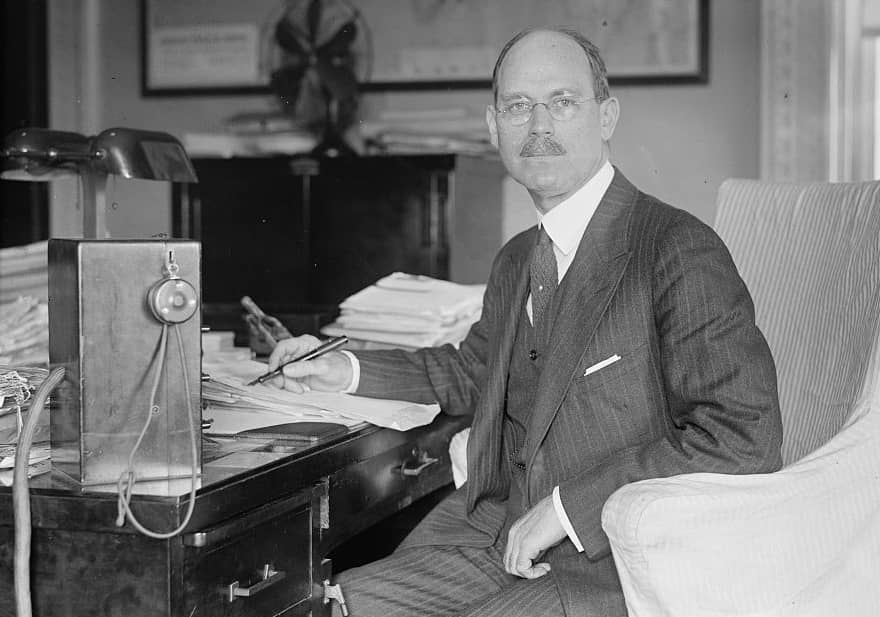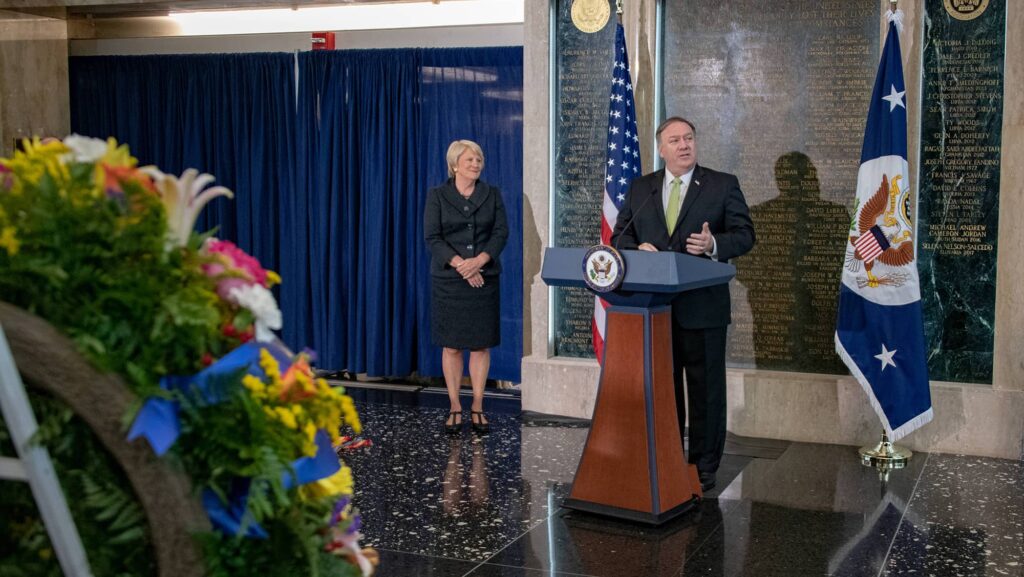In his short story “Mosby’s Memoirs,” which was based on the life of the conservative scholar and former State Department official Willmoore Kendall, Saul Bellow expressed his disdain for foreign policy mandarins: “…the Foreign Service is staffed by rejects of the power structure. Young gentlemen from good Eastern colleges who couldn’t make it as Wall Street lawyers were allowed to interpret the alleged interests of their class in the State Department bureaucracy.”
This unflattering verdict is not mentioned in Harry W. Kopp’s The Voice of the Foreign Service, but it is representative of the brickbats that American diplomats have often attracted over the decades. His careful and illuminating study covers the triumphs and tribulations of the State Department and the American Foreign Service Association, a professional association and labor union of diplomats that has periodically been engulfed in political and bureaucratic controversies. Throughout, he focuses on the slow and halting transformation of the State Department from a diplomatic backwater in the nineteenth century to a key institution in formulating American foreign policy.
The origins of the State Department were inauspicious. Headed by Thomas Jefferson, it comprised a small diplomatic establishment that epitomized George Washington’s oft-cited warning in his Farewell Address against entangling alliances. (More apt for contemporary Americans might be Washington’s adjurations in that address against the “insidious wiles” of foreign influence).
As Secretary of State, Jefferson sought to conserve the fledgling republic’s funds by maintaining foreign representation at what he termed “the lowest grades admissible.” Decades of relative peace later, Abraham Lincoln advised Secretary of State William Seward that consular positions, dedicated to helping private Americans overseas, should be employed to “facilitate artists” in their respective professions. Such literary worthies as Washington Irving, Nathaniel Hawthorne, James Fenimore Cooper and Bret Harte all held diplomatic or consular positions.
So feeble was the State Department that in a 1904 short story by O. Henry, a fictional consul sardonically complains that he twice cabled in – “[once] for a couple of gunboats to protect citizens. The department sent me a pair of gum boots. The second time when a man named Pease was going to be executed here. They referred that appeal to the Secretary of Agriculture.”
Nor were calls for it to be abolished outright uncommon. In 1889 the New York Sun deemed the State Department “a costly humbug and sham.” The Washington Post agreed: “There is no longer any need for men of affairs in one Foreign Service, and it had better be abolished.”
Instead, President Calvin Coolidge signed in 1924 the Rogers Act, a sweeping reform bill that created today’s Foreign Service of the United States. (The foreword to Kopp’s book by Tom Yazdgerdi does contain one slight error in connection with the Rogers Act. Yazdgerdi writes that the Foreign Service in the wake of the Rogers Act was “almost entirely male and white” and that the “lone black diplomat on staff, Clifton R. Wharton, was nearly denied entry…” But there was another member of the State Department named Lawrence Dennis who was of mixed race heritage and passing as white. His resignation in June 1927 from the State Department was reported in the New York Times. Dennis went on to become the author of several books and a leading exponent of fascism in America.)
The Rogers Act, Kopp explains, was the brainchild of a pertinacious civil servant named Wilbur J. Carr who was intent upon improving the consular service and who served in the State Department from 1892 to 1939, when he retired as ambassador to Czechoslovakia. According to Kopp, the bill unified the consular and diplomatic corps and ensured that the “Foreign Service would control its own recruitment, hiring, assignments, and promotions, but ultimate authority would rest with the Secretary of State.” The union of consuls and diplomats prompted the American Consular Association to authorize its executive committee to establish a new organization–the American Foreign Service Association.

The association established a journal and scholarships, but the Foreign Service suffered from austerity measures instituted during the Great Depression. As fascist dictatorships rose to power in Europe and Asia, the department, Kopp writes, was “poorly prepared for war.” President Franklin D. Roosevelt held no brief for the department, viewing its career diplomats as hidebound opponents of the New Deal. Anti-Semitism was rife in the State Department and a general lack of expertise hampered the ability of the Foreign Service to aid in the formulation of grand strategy. “Secretary of State Cordell Hull,” Kopp reports, “was deliberately kept absent from all the major wartime conferences.”
The State Department began to come into its own during the postwar era, when President Harry S Truman signed a new effort at reform–the Foreign Service Act of 1946. The act created an officer corps, a staff corps of officers and employees, and a reserve. In addition, Kopp writes, the act served as the foundation for the American Foreign Service Association to promote further reforms in coming decades.
As the State Department gained new influence, it became a lightning rod for attacks from the right. The exposure of former senior State Department official Alger Hiss as a Soviet spy, the fall of China and the Russian explosion of an atomic bomb created a wave of panic about the communist threat, both internal and external. The department became synonymous, at least on the right, with communist appeasers. Senator Joseph McCarthy announced before a Republican women’s group in Wheeling, West Virginia on February 9, 1950 that he had acquired a list of “205 individuals that were known to the Secretary of State as being members of the Communist Party and who, nevertheless, are still working and shaping policy in the State Department.”
McCarthy, as Sam Tanenhaus has noted in his book The Death of Conservativism (2009), was a lodestar for the postwar right. He refreshed the conservative war on Washington bureaucrats and big government, leading what Tanenhaus called an “incursion into the citadels of American power—the State Department, the CIA, and eventually the Army and the White House. He was the conservatives’ first insurrectionist.”
This impulse was widely shared on the right: Senator William E. Jenner, for example, said that Secretary of State Dean Acheson was a “communist-appeasing, communist-protecting betrayer of America.” Richard M. Nixon described Adlai Stevenson as holding a “Ph.D. from Dean Acheson’s cowardly college of communist containment.” Between 1947 to 1950, Kopp reports, the State Department terminated 202 employees as security risks—a number that rose to 411 by 1952.
How did the American Foreign Service Association respond? Kopp notes that it was “largely silent, at least for the record. Its Executive Committees and Boards of Directors issued no statements, and the presidents made no speeches. Minutes of meetings in the late 1940s and into the 1950s record no discussions of the shocks and humiliations inflicted on the Service.” One disgruntled member of Congress dismissed it as “an effete club of elderly gentlemen whose headquarters could not be located and who took care never to fight for any cause.” It was the nineteenth century all over again.
In 1980 Congress passed a bill that President Jimmy Carter signed to bolster the Foreign Service. Any lingering efforts to integrate the Civil and Foreign Services came to an unceremonious end. (Decades earlier George F. Kennan had denounced the notion in an essay for Foreign Affairs in which he alluded to himself as an “antiquated spirit” who preferred “25 really superior officers to 2,500 mediocre ones.”)
The Foreign Service Act of 1980 preserved the historic separateness of the service and codified its bargaining rights. According to Kopp, “The Foreign Service Act of 1980 marked a coming of age.” Membership in the association grew and its finances strengthened. It sought to protect its members from political assaults and became, writes Kopp, “an authoritative source of advice and guidance for Foreign Service employees regarding agency regulations.”
They would need it. What one Foreign Service official referred to as “the scapegoat years” ensued after the terrorist attacks of September 11, 2001. The State Department’s inspector general reported that the embassy in Riyadh had issued 32,000 visas—10,000 of them without review. Separately, a Government Accountability Office report stated that the vacancy rate for Foreign Service positions at hardship posts was, Kopp writes, “50 percent higher than in developed countries.” According to Kopp, “the reports of the inspector general and the GAO were validation for those in Congress, the administration, and the public who were prepared to believe that the Department of State was full of incompetents and the Foreign Service full of wimps.”
Morale plummeted. During the George W. Bush administration, the State Department experienced difficulties in filling positions in Afghanistan and Iraq. Kopp indicates that the American Foreign Service Association urged the State Department to call for volunteers—a move that successfully helped to fill positions in Afghanistan and Iraq. But Kopp cites some diplomats who claimed that, as a result of incentives given to those willing to serve in war zones, “assignments and promotions had been corrupted, that the department’s leadership and management had given preferential treatment to certain senior officers, staff assistants, and bureau favorites.”
Fresh travails arrived with the Trump administration. Kopp quickly dispatches the sad episode of Secretary of State Rex Tillerson, a Texas oilman who was convinced that he could revamp and streamline the department with management plans. Chaos ensued. President Donald Trump fired Tillerson. Matters improved only slightly with his replacement by former congressman and CIA Director Mike Pompeo.

By then the department was embroiled in the first impeachment hearing of Trump, when several senior Foreign Service officials were subpoenaed to testify before Congress, including Ambassador Marie Yovanovitch. She had resisted the efforts of the Trump administration to coerce Ukrainian officials into opening investigations into Vice President Joe Biden and his son Hunter, a member of the board of Ukrainian gas firm Burisma.
The American Foreign Service Association felt an obligation to support its members, aware that it had flunked the test during the McCarthy era. The association created a legal defense fund, raising $750,000 in a few months, and provided legal advice to Yovanovitch. In her memoirs, Yovanovitch recalled that it “told us that the administration would have a hard time disciplining or firing me if I testified. Most importantly, they assured me that my pension was safe.” After Yovanovitch retired in January 2020, Shawn Dorman, editor-in-chief of the Foreign Service Journal, extolled her: “While the Service lost another outstanding senior diplomat, it also gained a hero.” To Trump, however, Yovanovitch was part of a Washington foreign policy elite who sidestepped policies with which they disagreed – generally those promoted by elected conservatives – and instead followed their own mandates.
Kopp concludes on an optimistic note. He declares that when the American Foreign Service Association and State Department management collaborate to “educate the public, the administration, and Congress about American diplomacy and the need to support it, they carry weight. The more people know about the Foreign Service, the more favorably they see it.” He goes on to opine “That kind of cooperation was impossible during the Trump administration.”
What the 2024 election will bring for America’s professional diplomats is an open question. It isn’t credible to blame the Foreign Service’s continuing decline in policy relevance on Trump, after four years of Biden. But as Kopp’s detailed history underscores, the recent record of the American Foreign Service Association suggests that it will seek, as far as possible, to serve as a vociferous voice on behalf of the traditional rights and prerogatives of its members.

